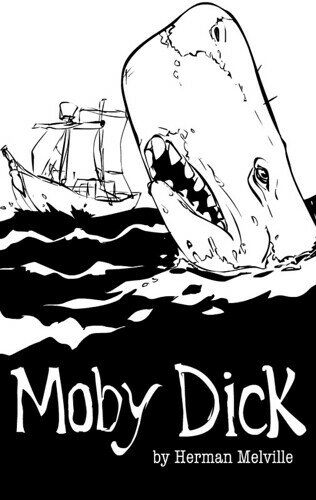Why Howard Butcher, you old subversive, you, teaching Moby Dick or, The Whale – a scriptural allegory that makes C.S. Lewis and John Bunyan read like Joel Osteen – to our impressionable youth. Fortunately for you, the story is so compelling and the characters so riveting and well-drawn, you will get away with it year after year.
Melville puts the reader in a biblical frame of mind straight off, before he even gets to the story, with his bizarre Extracts (Supplied by a Sub-Sub- Librarian) citing from the books of Genesis, Job, Jonah, Psalms, and Isaiah, among other quotes; which include lines from Pilgrim’s Progress and Paradise Lost. To keep us in a King James Bible mood, characters such as the ship owners Bildad and Peleg, first mate Starbuck, and it is presumed, Ahab himself, are Quakers all, keeping in their dialogue the formal “thee and thou” for which that sect was famous. Not long into the story, we are in the congregation of Father Mapple, preaching from his bowsprit pulpit in the Seamen’s Bethel (which the reader can still visit in New Bedford to this day) listening to expound upon – well, what else? – the book of Jonah, from whence the good father gives this warning:
“Shipmates, I do not place Jonah before you to be copied for his sin but I do place him before you as a model for repentance. Sin not; but if you do, take heed to repent of it like Jonah.”
Ahab will not, because he cannot, heed this warning, though he goes on to his doom with his eyes wide-open. In his post Howard quotes Peleg describing Ahab as “…a grand, ungodly, god-like man,” neatly describing the dichotomy of his soul. Is he lost to madness? No, he is self-aware to the utmost:
“What I’ve dared, I’ve willed; and what I’ve willed, I’ll do! They think me mad – Starbuck does, but I’m demoniac, I am madness maddened! That wild madness that’s only calm to to comprehend itself! The prophesy was that I should be dismembered; and – Aye! I lost this leg! I now prophesy that I will dismember my dismemberer.”
Ahab sees even the greatest of mysteries – how free will is but on our side of the tapestry; yet upon the eternal side all is preordained. Starbuck, now fully aware that it is “impiety and blasphemy” to continue the hunt for Moby Dick, once he has caused far more damage to boats and crews than he be worth in oil, is thus rebuked by Ahab:
“Ahab is forever Ahab, man. This whole act’s immutably decreed. ‘Twas rehearsed by thee and me a billion years before this ocean rolled. Fool! I am the Fates’ lieutenant; I act under orders. Look thou, underling! that thou obeyest mine.”
The obsessive hunt continues; with Ahab always in full control over the minds of his crew:
Like Macbeth crying “Lay on MacDuff, and damned be he who first cries hold!” in the end, Ahab goes willingly to his demise:
“Towards thee I roll, thou all-destroying but unconquering whale; to the last I grapple with thee; from hell’s heart I stab at thee; for hate’s sake I spit my last breath at thee. Sink all coffins and all hearses to one common pool! and since neither can be mine, let me then tow to pieces, while still chasing thee, though tied to thee, thou damned whale! Thus I give up my spear!”
Alas, it is not the whale that is damned, but Ahab himself.
The characters we meet along the way could be each the subject of his own novel: The quiet, introspective and spiritual first mate Starbuck; the devil-may-care (and oh, but he does!) second and third mates, Stubb and Flask; the exotic harpooneers Queequeg, Tashtego and Dagoo. Picture them now, on a “Nantucket sleigh ride,” being pulled through the waves at breakneck speed after the harpoon has found its mark; and while so tossed about, the mate and the harpooneer must switch positions from stern to bow, so that the mate may make the kill with his lance!
It’s no wonder many of Howard’s students “become fans of the novel – despite its length and challenging prose.” They may also be absorbing far more about the nature of evil than they would in a typical Sunday school class, but your secret is safe with me….
****
Photo by petesimon 



Comments
2
Leave a Reply
Fine article Mr. Barrow and thank you for the notice. I like your allusion to Macbeth. There is such a clear influence: Fedallah, Ahab’s evil shadow, foretells (like the evil weird sisters in Macbeth) that three things must happen before Ahab can die: he will see a hearse on the sea not made by mortal hands, he will see a 2nd hearse made of American wood, and Fedallah must die and reappear to pilot Ahab to his death. Ahab is also told that only hemp can kill him and he mistakenly concludes, “The gallows, ye mean. —I am immortal then… Read more »
Thanks! Here’s a bit of trivia about Moby Dick; we imagine him all white, like a living marble tomb seeking an occupant (Melville describes his open maw as “an open-doored marble tomb) and the two movies based on the book have him thus. While it may be the case that the real-life inspiration for him – Mocha Dick – may have been an albino, the whale Melville describes as Moby Dick is not. Only his wrinkled forehead and hump were white, the rest of him was only streaked and spotted white, like quartz embedded granite. Since his head and hump… Read more »